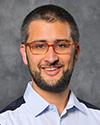SAGE Young Scholar Awardees
The Foundation for Personality and Social Psychology, in collaboration with SAGE Publications, is pleased to announce this year’s SAGE Young Scholars Awardees. These awards recognize outstanding young researchers in personality and social psychology. Awardees receive a one-time award of $5,000 to be used at their discretion for research, study, or conference travel-related purposes.

Wiebke Bleidorn is an Assistant Professor of Psychology at the University of California, Davis. She received a PhD in Psychology at Bielefeld University, Germany in 2010 and was an Assistant Professor of Psychology at Tilburg University, the Netherlands. Dr. Bleidorn’s research examines the conditions, mechanisms, and consequences of personality change.
-
Tell us a bit about your research.
My research examines the conditions, mechanisms, and consequences of personality change. Personality change is an emerging subfield that straddles the areas of personality, developmental, and social psychology; and my work sits at this intersection. I am interested in the social conditions under which people change, the genetic and environmental mechanisms that account for change, and the consequences of these changes for psychological functioning and important life outcomes. I pursue these interests by focusing on a wide array of individual difference variables including broad personality traits, goals, self-esteem, and virtues. -
How to do plan on using the award?
Throughout my career, I have benefited from having a strong network of international collaborators. This award allows me to promote the value of such international collaborations and to strengthen international networks. As a German researcher who has worked in Germany and the Netherlands and now has a faculty position in California, I feel well placed to draw on my existing international networks and extend their reach to other junior scholars. I plan to use the funds from the award to help funding the international travel needed to extend these collaborations and to draw in the junior scholars who typically do not get to benefit from such international networks. -
What advice do you have for fellow personality and social psychologists early in their research careers?
I think it is important to enjoy what you are doing; to love the process not just the product. It is amazing that we can build an entire career out of studying the questions that occupy our minds; and I would suggest (at least once in a while) stepping back and thinking about how exciting our job is.

Jon Freeman is Assistant Professor of Psychology at NYU. He received his Ph.D. from Tufts and was previously on the faculty at Dartmouth. He studies split-second social perception using brain- and behavior-based techniques, examining the interplay of visual perception and social cognition in how we categorize others and infer personality traits and emotion.
-
Tell us a bit about your research.
My program of research focuses on split-second social perception—how we use facial cues to instantly categorize other people into social groups and perceive their personality traits and emotion. My lab uses a wide range of brain and behavior-based techniques to study the interplay of visual and social processes in rapid person judgment, including the roles of specific facial cues, social context, and individual differences. We also explore how the brain represents social categories and core trait dimensions, and how initial perceptions influence downstream behavior and real-world outcomes.
Social psychologists have long known that we readily sort other people into social categories, but the underlying processes that culminate in these initial categorizations have remained elusive. My work investigates the processes giving rise to these initial categorizations by integrating approaches and insights across social psychology and the cognitive, vision, and neural sciences. Much of my work has found that there is interesting complexity that occurs well before an individual stabilizes on particular perceptions of another person’s face—before a “snap” judgment crystallizes in the brain. My colleagues and I have also shown that these complex dynamics occurring during the process of initially categorizing another person may uniquely influence a variety of downstream social processes, such as evaluation, important social decision-making, and real-world outcomes. To explore these questions, we use a multi-method approach incorporating behavioral paradigms, brain-imaging, electrophysiology, and computational modeling, as well as real-time behavioral techniques such as mouse-tracking.
Using these converging methodologies, our work has shown the split-second process of social perception to be fundamentally dynamic, where basic visual perceptions are partly malleable and shaped by prior social knowledge, stereotypes, and other aspects of social cognition. It is an automatic, yet gradual, process of negotiation between the many sensory cues “actually” inherent to a person (e.g., facial cues), and the baggage a perceiver brings to the perceptual process (e.g., stereotypes). As such, initial perceptions are not discrete “read outs” of facial features; they evolve over hundreds of milliseconds and are altered by context and one’s stereotypes and motives. During this process, top-down social cognitive factors fluidly interact with bottom-up visual cues to fundamentally shape how we visually construe other people. The hope is that by zooming in on this initial split-second process of perception, and theoretically and empirically connecting it with the downstream processes more traditionally at the center stage in social psychology, we will be able to achieve a more accurate and truly complete understanding of social perception. -
How to do plan on using the award?
I’m excited to use the funds to support new directions in my lab’s research involving multivariate neural-decoding approaches with innovative behavioral paradigms that allow us to better assess ‘representations’ (loaded term, I realize) of critical importance to social psychology, including 1) the visually-based origins of certain forms of bias and possible visually-based interventions to reduce social biases; 2) the inherent malleability of social categorization, category learning, and stereotype change; 3) the impact of social cognition on visual object recognition and new accounts of weapon bias; and 4) development of a comprehensive model of face-based trait inferences (e.g., trustworthiness, competence, etc.) that addresses visual, semantic, and social-contextual impacts. -
What advice do you have for fellow personality and social psychologists early in their research careers?
I’m continually inspired by the work of my fellow junior scientists, and I hardly feel entitled to be giving them any advice! All I can suggest is to do the work you love, read widely, and think broadly. Our time is so constrained as junior scientists and the natural tendency and expectation in general in science is to focus and create your niche, and I think sometimes this unfortunately encourages us to dismiss other research areas as irrelevant or not worth our time, and inadvertently to become somewhat narrow. In my view, some of the most interesting and impactful research can be inspired from integrating insights from a seemingly unrelated area.

Ulrich Orth is an Associate Professor of Psychology at the University of Bern. He completed his PhD at the University of Trier, was a postdoc at University of Bern and UC Davis, and was an assistant professor at University of Basel. His research focuses on self-esteem development across the lifespan, the link between low self-esteem and depression, and the consequences of self-esteem for important life domains such as relationships, work, and health. In 2013, he received the William Stern Award for Personality Psychology from the German Psychological Society.
-
Tell us a bit about your research.
During the past years, I have been pursuing three lines of research, all focusing on self-esteem. Although self-esteem has been extensively studied for decades, there are still many unresolved and hotly debated questions in this field of research. Therefore, the goal of my research program has been to answer the following questions: How does self-esteem develop across the lifespan and which factors influence the individual trajectory? Is low self-esteem a vulnerability factor for depression and, if so, which mechanisms account for the effect? Is self-esteem consequential for success and well-being in important life domains such as relationships, work, and health? In my research, I use web-based methods for collecting data over a fairly wide range of study designs (e.g., longitudinal, diary and dyadic designs). Moreover, I often use archival datasets, which frequently have important advantages such as providing multiple waves of data, extensive study periods, and large and nationally representative samples. For the analyses, I use statistical methods such as structural equation modeling, latent growth modeling, and meta-analysis. By using these types of data and methods, I seek to increase the validity and generalizability of the findings. traits, goals, self-esteem, and virtues. -
How to do plan on using the award?
The award will greatly help me to cover research-related expenses for my lab, such as travel expenses for conferences and compensation of study participants. -
What advice do you have for fellow personality and social psychologists early in their research careers?
That’s a difficult question because clearly no advice will work for everybody. But I would like to address one issue that arises regularly, namely, whether it’s better to focus on quantity or quality in research. Of course, most people would say that it’s important to do high-quality work. Nevertheless, you have to make decisions on how to use scarce resources, and in particular on the time that you can devote to research. Should you select several easy projects or one more ambitious project instead? How much time do you want to spend on figuring out how to analyze some complicated data? Although both quantity and quality in publications, grants and so on will help in a career, I tend to think that it’s better to give priority to quality for several reasons. First, one good paper often makes a larger scientific contribution than several papers that are so-so. Second, your personal learning outcome might be greater. Third, in the long run you might gain more satisfaction from what you’re doing.

Cheryl Wakslak is an assistant professor of management and organization at the University of Southern California. She earned her PhD in social psychology from NYU in 2008. Her research explores the way people use different styles of thinking to help them connect with those closer to them and those farther away.
-
Tell us a bit about your research.
I am fascinated by how people navigate the space between themselves and others. Much of my work to date has approached this issue from a cognitive perspective, arguing that people engage in abstract mental processing to meet the challenge of interacting with distal others. Abstraction involves distilling an item or event to its few superordinate features rather than preserving concrete and contextualized details. Because abstract mental representations contain the aspects of an item or event that are most likely to retain their meaning across distance, they are useful when trying to connect with distant others, whose concrete experiences and knowledge are likely to differ from one’s own.
My collaborators and I have taken this straightforward idea and used it to address a variety of more specific questions. For example, in a series of recent papers we have focused on the process of communication, finding that people’s style of communication is influenced by the audience’s distance, and by its size, with distant and large audiences triggering more abstract communication. In related work, we have looked at the way communicative abstraction might signal distance; in particular, that it might act as a cue that a speaker is powerful or suited to power (a dimension linked in prior work with distance), an effect we have found in the lab, and in consequential real-world contexts. In other, complimentary projects we’ve used this general perspective to explore a range of interpersonal contexts, including social exchange, social comparison, and social learning. This research also dovetails well with other work I’ve been pursuing since graduate school exploring implications of distance for more intrapersonal processes, such as decision-making and self-conceptualization. -
How to do plan on using the award?
I plan to use the award to support new research activities – I like thinking of this as seed money for something of a “high-risk” account that will allow me to test some of my zanier ideas! -
What advice do you have for fellow personality and social psychologists early in their research careers?
This is a big question, so I’ll resort to a whole list!
a. Invest in relationships: A major relationship early in your career is the one you form with your advisor. Yaacov Trope, my advisor in graduate school and my continued collaborator and friend, is my research hero and academic role model. But also vital are the relationships you form with your fellow students – these are the folks who get you through the day in grad school, and they can also form the core of your support network for many years afterward. In my case, they are family; the people I turn to for advice all the time and collaborate with frequently. And as you move into a faculty role, I think the same message applies. From the other side of the desk, it’s amazing to realize what a large responsibility it is to mentor graduate students. It only makes me marvel more at my own mentors, and to try as much as possible to invest the same in my own students.
b. Celebrate everything: A member of my dissertation committee said this to me years ago and I always repeat it to my own students. Academia is fantastic – but it’s also replete with negative feedback. You submit a paper, and people tell you what is wrong with it; a grant application, and they explain to you why your idea is not original and also not going to work… The antidote is to celebrate things constantly. You submitted the paper? Celebrate. Paper got an R&R? Celebrate. A second R&R? Celebrate. Accepted? Celebrate. In print? You got it, celebrate.
c. Find the right audience: My first publication experience was the best first experience I could imagine. Here’s the story: I had been working on a project with a wonderful mentor, Tom Tyler, on how people make judgments about whether they have been racially profiled. We submitted a manuscript to JPSP, which was not just rejected but slaughtered. We regrouped, made some improvements and decided to submit the paper to a top-tier criminal justice journal, thinking that the question we were addressing was perhaps less novel from a psychological perspective, but important for the criminal justice audience to appreciate. The paper got some of the best reviews of my career and was conditionally accepted in the first round. It is currently one of my most highly cited papers. This taught me the importance of finding the right audience. Think about whom you are targeting your work to, and what the questions that audience cares about are. Might this suggest a deeper, more impactful way of thinking about your contribution? Or, alternatively, is there a different audience that is the more natural audience for this work?
d. Make your own choices: You have to live a life that is true to who you are, even if that means you sometimes make less conventional choices. I was something of an anomaly in graduate school because I had children (yes, note the plural!) while in school. Did it make things more complicated? Of course – it still does! But I’ve never doubted that decision because it was important to me to live my life the way I was choosing to do it. Which leads back to mentorship – I was blessed to work with people who wanted me to flourish as a person, not just to flourish as their student, which definitely made the process a lot easier.
e. Appreciate the big picture (aka, it’s all about construal): I think it can be surprisingly easy to lose sight of the larger picture in academia. First of all, academic life is amazing! I still can’t believe I get paid to spend the majority of my day talking about ideas. I think we don’t focus enough on the joy of what we do, but rather get sucked too readily into the sometimes-frustrating specifics. I also think a big-picture focus can be super helpful for pushing your research forward. A major lesson I learned from Yaacov is not to short-change your ideas; dig deeper and really push at your ideas, connecting them to more and more fundamental questions.

Adam Waytz is a psychologist at Northwestern University’s Kellogg School of Management who studies how people think about minds. He looks at when we attribute or deny mental states to other entities, and the moral and ethical implications of these processes.
-
Tell us a bit about your research.
My research explores how people understand the intentions, desires, emotions, and beliefs of those around them. Numerous societal questions, from the legal rights of corporations, to the blameworthiness of a self-driving car involved in a collision, to the acceptability of torture, center on the degree to which people perceive the entity in question--an organization, a vehicle, a prisoner--to have a mind. Both philosophical and lay definitions of humanness indicate that perceiving a mind represents the essence of considering an entity to be human--humanization. Denying or overlooking mental capacities in others, conversely, represents dehumanization. My research focuses on the causes and consequences of these processes of humanization and dehumanization as well as their implications for ethics and morality. -
How to do plan on using the award?
I plan on using the resources provided by the award to increase the robustness, generalizability and reliability of my work by conducting high powered studies and internal replications, testing my research questions across diverse samples, and using more ambitious methods. -
What advice do you have for fellow personality and social psychologists early in their research careers?
My first piece of advice would be to find brilliant collaborators and take joy in collaboration. Any research success I have had is attributable to exactly that. My second piece of advice would be to make sure you are invested in research for intrinsic reasons. To paraphrase my mentor, John Cacioppo, given that so much of what we do results in rejection--rejected manuscripts, rejected grant applications, failed studies, criticism of our ideas--we will be most fulfilled when we pursue research for our own interests and enjoyment rather than seeking external validation.

